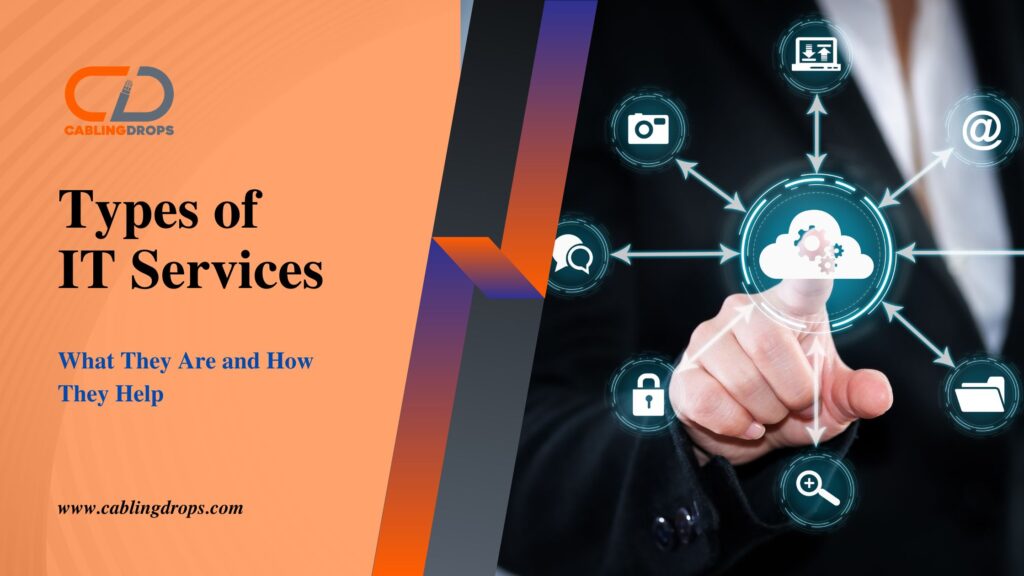
Table of Contents
Request A Quote Today!
"*" indicates required fields
Information technology (IT) services are now crucial to practically every corporate operation in the modern digital age. There is no denying the importance of IT infrastructure and support for businesses of all sizes. IT services provide a broad spectrum of products and services tailored to address particular requirements and obstacles companies encounter while maintaining their technological infrastructure. This article will examine the different kinds of IT services, their advantages, and how they may help companies thrive in the digital era.
Different Types of IT Support that Benefit Your Business

Cloud Services
Cloud computing has completely transformed the way companies handle, store, and access data and apps. Platform as a Service (PaaS), Software as a Service (SaaS), and Infrastructure as a Service (IaaS) are just a few of the services that fall under the umbrella of cloud services. By utilizing cloud services, businesses may lower capital costs, increase flexibility and cooperation, and scale their IT infrastructure on demand.
With the unmatched scalability that cloud services provide, companies may quickly increase their IT resources as their needs develop. Pay-as-you-go access to virtualized computing resources, such as servers, storage, and networking, is possible for enterprises using Infrastructure as a Service (IaaS). Because of this flexibility, companies may adjust their infrastructure to meet demand, maximizing resource efficiency and lowering expenses.
Network Security
Network security is paramount in today’s interconnected world of constantly evolving cyber threats. IT support companies provide network security services to protect businesses’ networks, systems, and data against malware, illegal access, and other cyberattacks. Some services include vulnerability assessments, intrusion detection, firewall administration, and security incident response.
With network security services, organizations can rest easy knowing that their valuable assets are shielded from cyberattacks. By implementing strong security measures, organizations can reduce the risk of data breaches, monetary losses, and reputational harm. Network security is crucial for protecting sensitive data and upholding regulatory compliance for all sizes of businesses.
Software as a Service (SaaS)
SaaS solutions’ affordability, scalability, and flexibility have made them popular with companies of all kinds. Organizations can access a variety of software tools and services via the Internet by subscribing to SaaS apps, which do away with the requirement for on-premises installs and maintenance. SaaS solutions give businesses the flexibility and agility to adjust to shifting market dynamics in various areas, including project management, accounting, email, and communication.
SaaS solutions provide many advantages to businesses, such as decreased IT overhead, easier software management, and enhanced productivity and teamwork. Thanks to SaaS, businesses can always have access to the newest tools and capabilities, enabling them to download and install the latest software updates and features immediately. Furthermore, SaaS systems usually have flexible pricing structures that let companies pay for the resources they use.
Managed IT Services
Managed IT services involve contracting with a third-party company to handle and maintain IT systems and infrastructure. These services include proactive monitoring, routine upkeep, help desk assistance, and strategic IT planning. By collaborating with a managed IT services provider, businesses may ensure maximum performance and dependability of their IT environment while concentrating on their core operations.
By using managed IT services, businesses can hire and retain an internal IT workforce at a lower cost. By outsourcing IT management to a reliable partner, companies can access a group of experts with a wide range of technological and subject experience. This allows companies to maximize their IT infrastructure and accomplish their goals by utilizing industry standards and best practices.
Cybersecurity Services
The growing sophistication and frequency of cyberattacks have made cybersecurity a critical concern for companies of all kinds. Cybersecurity services include various tools to defend enterprises’ digital assets against online attacks. Some offerings include threat intelligence, endpoint security, security awareness instruction, and incident response.
Cybersecurity services assist businesses in fending off various online dangers, such as ransomware, phishing scams, malware, and data breaches. By implementing strong security measures and best practices, businesses may lower the likelihood of security events and lessen the possible effect of cyberattacks. Cybersecurity services also assist companies in protecting sensitive data, adhering to legal requirements, and preserving their brands’ integrity.
Hardware and Software Support
IT equipment and applications are maintained, repaired, and troubleshooted by hardware and software support services. IT support providers ensure that companies’ technology investments continue to function effectively, whether it’s through hardware repair, software patch updates, or compatibility concerns.
Hardware and software support services are necessary to guarantee the dependability and efficiency of IT applications and infrastructure. IT support providers help reduce downtime and disruption to corporate operations by quickly and effectively resolving hardware and software issues. Furthermore, by increasing the value of software programs and prolonging the lifespan of hardware assets, hardware and software support services assist businesses in making the most out of their IT expenditures.
Technical Support
Technical support services include offering advice and support to end users who are having problems or difficulties with IT. This could involve adjusting network settings, configuring hardware, fixing connectivity problems, and debugging software failures. Business continuity and downtime reduction depend on timely and efficient technical help.
Technical support services are essential for assisting end users in resolving IT-related issues and increasing productivity. Technical support teams help users solve problems fast and effectively while reducing disturbance to business operations by offering prompt and expert assistance. Technical support services also give customers the information and abilities they need to use IT resources and tools efficiently, which improves their overall experience and happiness.
On-Demand IT Support
With on-demand IT support services, companies can get the help they need when they need it without having to sign a long-term contract. On-demand IT support providers provide prompt, affordable solutions customized to meet organizations’ unique needs, whether handling pressing problems, implementing system improvements, or offering ad hoc advice.
With the flexibility and agility that on-demand IT support services offer, businesses can respond quickly and effectively to IT-related issues. Companies can avoid the costs associated with retaining an internal IT staff through on-demand assistance by having access to knowledge and resources as needed. Because of this, companies may adjust the amount of IT support staff they have in response to demand, maximizing efficiency and minimizing expenses.
Data Management Services
Data management services entail gathering, storing, processing, and analyzing massive volumes of data to produce actionable insights and facilitate decision-making. IT support companies assist businesses in efficiently managing their data assets by providing data management solutions, such as database management, data integration, data warehousing, backup and recovery, and data integration.
Data management services are essential for helping companies use data as a strategic asset. Implementing strong data management solutions can give organizations a competitive edge and valuable insights into their data, allowing for well-informed decision-making. Furthermore, by safeguarding confidential data and reducing the possibility of data loss or illegal access, data management services assist businesses in maintaining data integrity, security, and compliance.
Choosing the Right IT Support Partner
Choosing the correct IT support partner is essential for companies trying to grow and use technology efficiently. When assessing possible IT support services, consider customer service, scalability, competence, experience, and reliability. Seek a partner who can provide customized solutions to meet your company’s demands and objectives.
Cabling Drops: Your Trusted IT Support Provider
At Cabling Drops, we recognize the value of dependable and effective IT support in today’s cutthroat corporate world. We provide a wide range of IT services tailored to our client’s needs, backed by years of experience and a trained professional team. We can help you succeed whether you require managed IT services, network security solutions, or assistance with data management.
Frequently Asked Questions
What are the different types of IT support systems?
IT support systems encompass a wide range of services to manage, maintain, and optimize an organization’s technology resources. Some common IT support systems include managed IT services, network security solutions, technical support, data management services, and cloud services.
What is the role of user training and education in IT support?
User training and education are essential components of effective IT support. By providing employees with the necessary knowledge and skills to use IT resources efficiently and securely, businesses can minimize user errors, improve productivity, and enhance cybersecurity posture.
How does cybersecurity support help protect organizations from cyber threats?
Cybersecurity support services help organizations protect their digital assets from various cyber threats, including malware, phishing attacks, ransomware, and data breaches. These services involve implementing robust security measures, conducting regular vulnerability assessments, and providing security awareness training to employees.
Are there specialized types of IT support for specific industries or sectors?
Yes, many IT support providers offer specialized services tailored to specific industries or sectors, such as healthcare, finance, retail, and manufacturing. These services address industry-specific challenges and compliance requirements, ensuring businesses can leverage technology effectively while meeting regulatory standards.
What is network support, and why is it essential for organizations?
Network support involves managing and maintaining an organization’s infrastructure to ensure optimal performance, reliability, and security. This includes network monitoring, troubleshooting connectivity issues, configuring routers and switches, and implementing security protocols.